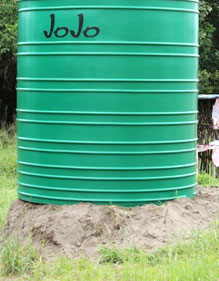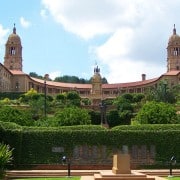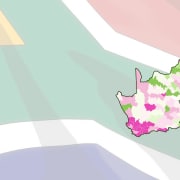|
Getting your Trinity Audio player ready...
|
 By Gcina Ntsaluba
By Gcina Ntsaluba
With about 14 % of its people having no access to clean water, in this respect KwaZulu-Natal (KZN) is one of the worst affected provinces in South Africa, according to a water and sanitation report released earlier in March 2014 by the South African Human Rights Commission (SAHRC).
While the national average for access to acceptable levels of water stands at 85%, in some provinces like KZN, it remains critical.
A major contributing factor to this dire situation, notes the report, is the “systemic failures in governance and budgeting, particularly in the implementation of and spending on projects”.
These failures point to the need for government to evaluate the current models of governance and funding, the report says.
Ambitious project
In 2011 the KZN provincial government, through the Department of Human Settlements and the National Home Builders Registration Council (NHBRC), set out to address critical water shortages by introducing a multi-million-rand water tank installation project for RDP and rural households throughout the province.
The project’s aim was to make clean water more accessible by supplying households with tanks to harvest rain water.
As much as the project was well-intended, a Corruption Watch investigation following a tip-off has revealed that it was littered with problems and heavily compromised by poor governance – in line with general SAHRC findings. It was also hampered by lack of consistent oversight during the implementation stage and thereafter.
As a result, beneficiaries are disappointed and dissatisfied, and tanks have been badly installed and, in some instances, rendered unusable.
The two-month investigation by CW shows that private company Hydrotek International (Pty) Ltd was appointed in October 2011 by the NHBRC as project manager to oversee the tank installations, after a competitive bid process.
In turn Hydrotek engaged three installer companies to do the physical installation of the tanks at a fixed rate. According to Hydrotek, the three installers were pre-selected by the NHBRC.
Once the contracts between Hydrotek and the three installers – Uvuko Civils, Vuka Civils and DR Bongani Investments – were concluded, cracks started to appear in what would otherwise have been a laudable project.
According to confidential letters seen by CW, sent by Hydrotek and addressed to both the KZN provincial and the national departments of human settlements, it appears as if the project was doomed from the start. Amongst other things Hydrotek claims that:
- The three installers that were imposed on Hydrotek did not have enough capacity to carry out the work;
- After the installers were appointed, they began dictating the terms of their engagement with Hydrotek. They demanded to be paid directly by NHBRC in apparent contravention of supply chain management policies;
- A second contract was signed in February 2012 by NHBRC and Hydrotek but it was not accepted by the NHBRC supply chain management;
- The NHBRC eroded the role and authority of Hydrotek, the project manager, by allowing the installers to dictate their working terms and conditions with Hydrotek.
Irregularities in the project
Corruption Watch has also ascertained that a director in one of the installer companies was formally a council member of the NHBRC until her resignation in December 2010 – less than a year before the private company was appointed as an installer.
Uvuko Civils, in a written response to CW’s questions, raised some concerns with the project, such as having to redo existing poor work. Uvuko maintained its adherence to the service level agreement throughout.
DR Bongani declined to comment and referred all queries to the NHBRC. CW’s numerous attempts to reach Vuka Civils were unsuccessful.
In addition to general governance issues plaguing the project, Corruption Watch has learnt from an internal audit report leaked to it that during the project’s implementation stage, there were a number of additional irregularities which raised alarm bells early on, such as the duplication of beneficiaries and housing stand numbers by installers, against which payment was claimed.
But keeping records of the names of the beneficiaries of the tanks was not a requirement of the project, according to the NHRBC.
At the heart of the leaked internal audit report are the following significant findings:
- 313 identity numbers that were used for claiming payments by the water tank installers do not comply with the Department of Home Affairs regulations;
- 240 tank installations were paid without the home owner’s ID number or stand numbers referenced on the invoices;
- 398 identity numbers were duplicated and payment was made against them.
Defensive reaction
The NHBRC has disputed the authenticity of the internal audit report.
Corporate communication manager Wanda Lubelwana, in a confusing response to Corruption Watch’s probe, denied the audit report’s authenticity on the one hand, and said it was “a work in progress paper whose findings have not been tested and/or validated” on the other.
Following this, Corruption Watch requested the report referred to by Lubelwana using the Promotion of Access to Information Act (PAIA). The substantive response to this PAIA request is awaited.
Lubelwana said the payment of invoices to installer companies was made following verification of installations on the NHBRC PDA technology. He said NHBRC inspectors were used to verify and sign off on water tank installations.
Lubelwana also said that the NHBRC was conducting a door-to-door verification and where there were problems, the installers would rectify such at their own cost.
Corruption Watch welcomes this verification process, but is concerned that verification and oversight were not consistent features of the project. Such verification also provides little comfort to the community members in KZN who are feeling the effects of a project compromised by poor governance.
The spotlight is not only on the Department of Human Settlements and the NHBRC – the private installer companies should also feel the heat. The recent SAHRC report makes it clear: water should be viewed as a right rather than a commodity, and private companies too must understand this fundamental principle.







